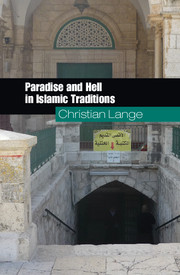Book contents
- Frontmatter
- Dedication
- Contents
- List of Figures
- List of Table and Charts
- Acknowledgements
- List of Abbreviations
- Note on Dates, Citation, Translations, and Transliteration
- Introduction
- Part I Textual Foundations: Narrating the Otherworld
- Part II Discourses and Practices: Debating the Otherworld
- Epilogue
- Primary Sources
- Secondary Sources
- Index of Names
- Index of Terms
Introduction
Published online by Cambridge University Press: 05 December 2015
- Frontmatter
- Dedication
- Contents
- List of Figures
- List of Table and Charts
- Acknowledgements
- List of Abbreviations
- Note on Dates, Citation, Translations, and Transliteration
- Introduction
- Part I Textual Foundations: Narrating the Otherworld
- Part II Discourses and Practices: Debating the Otherworld
- Epilogue
- Primary Sources
- Secondary Sources
- Index of Names
- Index of Terms
Summary
According to legend, after the caliph ʿUmar b. al-Khaṭṭāb's (r. 13–23/634–44) conquest of Jerusalem in the year 16/637, one of his soldiers, a man named Shurayk b. Khabāsha al-Numayrī, went to fetch water from a well on the Temple Mount. As al-Wāsiṭī (d. ca. 360/970), a preacher in the al-Aqṣā mosque, relates in his hagiography of Jerusalem, The Virtues of the Holy City (Faḍāʾil Bayt al-Muqaddas),
suddenly the bucket fell from [Shurayk's] hands, and so he descended [into the well] to search for it. A man appeared to him in the well and told him to follow him, taking him by the hand and ushering him into the Garden. Shurayk took leaves [from a tree in the Garden]. Then the man led him back, and [Shurayk] exited [the well]. He went to his companions and told them about it. His story was brought before ʿUmar b. al-Khaṭṭāb, who said: “Shall a man from this community enter the Garden while he is alive among you? Look at the leaves! If they have withered, they are not from the Garden. If they haven't withered, they are.” … And indeed, the leaves had not withered.
Shurayk is said to have kept the leaves he brought from his subterranean visit to paradise, guarding them in his personal copy of the Qurʾān until his death, and to have been buried with them, placed delicately between his chest and the burial shroud covering his corpse, when he was laid to rest in the Syrian village of al-Salamiyya. Some thirteen centuries later, between 1938 and 1942, archaeologists excavated what appeared to be the remains of the well inside the al-Aqṣā mosque. To this day, one can see, to the left of the entrance to the mosque, the stairway leading down into the vast system of tunnels below the Temple Mount, a mysterious subterranean maze in which, according to Muslim tradition, flow the rivers of paradise.
The “Story of the Leaves” (ḥadīth al-waraqāt), as it is known, encapsulates a tension that underpins conceptualisations of the otherworld across a wide spectrum of Islamic religious discourses. The idea that the boundary between this world (al-dunyā) and the hereafter (al-ākhira) cannot be traversed, except after death, is etched deeply into Muslim thought. ʿUmar's reticence is a case in point.
- Type
- Chapter
- Information
- Paradise and Hell in Islamic Traditions , pp. 1 - 34Publisher: Cambridge University PressPrint publication year: 2015



